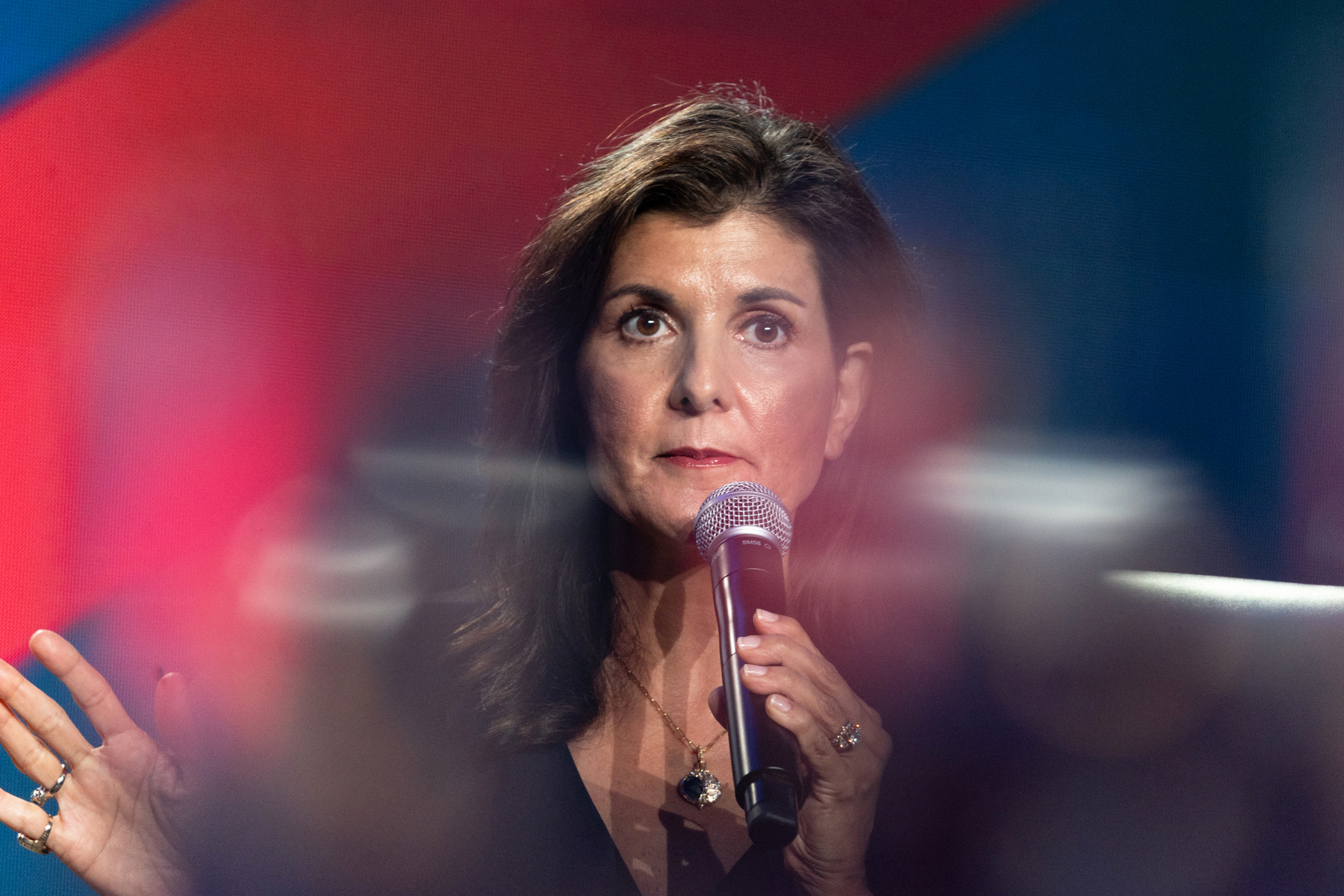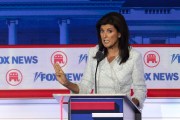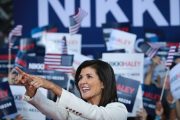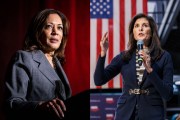Your trusted source for contextualizing politics news ahead of Election 2024. Sign up for our daily newsletter.
Republican presidential candidate Nikki Haley on Wednesday will become the 12th woman ever to participate in a presidential debate in the nation’s 200-plus year history of presidential politics, and only the third Republican woman to ever do so.
The former U.S. ambassador to the United Nations and South Carolina governor will take the debate stage in Milwaukee as the lone woman in the 2024 GOP primary field, searching for an opportunity to stand out among the field of men and bring momentum to a lagging campaign.
-
What happened Wednesday night:
-
What happened Wednesday night: Nikki Haley goes on the attack in first Republican debate
Haley hasn’t spent much time highlighting her role as the only woman or woman of color in the field, even as she teases that the country could benefit from the unique strength of women leaders. Haley, who is Indian American, will be the first Republican woman of color to participate in a presidential debate, and follows Republicans Carly Fiorina and Michele Bachmann as lone GOP women on the debate stage.
“Having Nikki Haley on the debate stage is incredibly important, and I wish she weren’t standing alone,” said Julie Conway, the executive director of VIEW PAC, which recruits and backs Republican women running for Congress. “[Voters] need to see incredible accomplished GOP women who are clearly qualified and deserving of holding the highest office in the land.”
But in a primary that has come to be defined by its hypermasculinity and bravado, Haley’s gender and any sexism she faces on stage could thrust her into a spotlight that so far has evaded her campaign.
“I’ve called it an eggplant measuring contest — [all of the men] have been trying to out-macho each other throughout the campaign,” said Jennifer P. Lim, a founder and executive director of Republican Women for Progress, which works to boost the ranks of Republican women in office.
“I think this could be a really good chance for her to look like the more serious nominee,” she said.
-
Read Next:
In interviews leading up to the debate, Haley has offered a preview of the fine line she intends to walk on the debate stage: “I think that when I become the first female president, it won’t be because I’m a woman. It’ll be because … I’m the right person for the job,” Haley told Politico and ABC News at the Iowa State Fair.
The dynamics of the debate, particularly the specter of sexist attacks against Haley, will be marked by the absence of former President Donald Trump, who has decided to skip the debate pointing to polling that has registered him far ahead of the rest of the pack. Trump, who has made a pattern of crude attacks against women opponents, has instead taped an interview with former Fox News host Tucker Carlson that will make the rounds on debate night. It’s unclear if he’ll mention Haley at all.
Fiorina, who took the GOP debate stage as the lone woman in the fall of 2015 next to Trump, briefly shot up to second place in the polls after the moderator asked her to react to derogatory comments by Trump about her appearance — “Can you imagine that, the face of our next president?!” — in Rolling Stone.
“I think women all over this country heard very clearly what Mr. Trump said,” Fiorina replied, attracting enthusiastic applause.
Sarah Isgur, Fiorina’s campaign manager, described the fallout in an essay for The Atlantic. “Three days after the debate, Fiorina had jumped 12 points in the polls — she was now sitting in second place — and Trump had dropped eight points,” Isgur wrote. “Donations were pouring in. We suddenly felt like we had momentum.”
Haley’s campaign has struggled with momentum among voters from the start, unable to stand out even among those at the bottom of the pack. An August poll of likely caucusgoers in Iowa, the first GOP primary contest, registered support for Haley in the single digits, behind fellow South Carolinian Sen. Tim Scott and tied with former Vice President Mike Pence.
Trump controls the field at 42 percent, and Florida Gov. Ron DeSantis, the most viable alternative to Trump though his own campaign has struggled, registered at 19 percent, according to the NBC News/Des Moines Register poll. A recent poll out of New Hampshire, the second primary contest, shows Haley stuck in the low single digits, even as support for DeSantis drops.
“Nikki often says, ‘If you want something done right, ask a woman,’ and most women would agree that’s true. If only we could get them to agree that woman is Nikki,” said Jane Johnson, an official in the New Hampshire Federation of Republican Women, who is not endorsing in the race but sees Haley as highly qualified.
Johnson, a Cheshire County, New Hampshire, resident who previously served in the statehouse, said she has seen Haley in person several times since the candidate began to explore a campaign for president. She described Haley as really personable, “like a neighbor,” and said she is proud to see her in the race.
In interviews, Haley has said her campaign has yet to spend the kinds of advertising dollars her opponents have poured into the race. This month, the super PAC backing Haley launched its first TV ad buy focused on the threat of China and Haley’s experience at the United Nations. The ad, unlike Haley’s campaign launch teaser, which featured a line about kicking enemies with her high heels, makes no reference to her gender.
In the GOP field, Haley and other conservative women have used their gender to push back against Democrat attacks on the party and conservatism, said Catherine Wineinger, an expert on gender and politics at Western Washington University who has studied women in the Republican Party.
“She’s balancing the idea that, ‘I’m the best candidate because I’m a strong conservative,’ and on the other hand, she’s also trying to show that because she’s a woman, that she also can speak to these conservative issues from that standpoint — as a conservative woman, as a mom,” Wineinger said.
Haley’s comments criticizing transgender girls occupying girls’ locker rooms included a mention of her daughter, who ran track in high school. Haley’s stump speech regularly includes a mention of her son being forced to “write papers that he doesn’t believe in,” alluding to the culture wars Republicans have waged against higher education.
The participation of trans girls in girls sports “is the women’s issue of our time,” Haley said in June at an Iowa town hall, a remark she’s repeated. Haley also falsely linked a rise in suicidal ideation among teen girls to trans student athlete participation.
Still, Lim said she’s seen Haley use her gender to bring nuance to policy discussions. She pointed to Haley’s speech on abortion in April, during which Haley argued that a majority of Americans could coalesce around some restrictions on abortions, and that she would work to find such “consensus” before laying out what kinds of policies she would support.
Haley talked about her experiences with infertility, her husband’s own adoption and a friend’s fears of an unplanned pregnancy following rape. “She’s being a little bit more nuanced in her communication about a topic that’s such a stumbling block for the Republican Party,” Lim said.
But Lim said that Haley’s comments surrounding trans girls “takes us back.”
“I think this is really a time when she could get some momentum — and she doesn’t have to rely on attacking Kamala Harris or talking about trans kids,” Lim said.
Lim’s group is promoting a Twitter hashtag — #DebateWithRWFP — to engage conservative women on their reactions to the GOP primary debate.
While Haley’s lone status among the mix of seven men at the debate stands in stark contrast to the many Democratic women who took the stage in the 2020 cycle, those debates marked the first time an official presidential debate featured more than one woman. Six Democratic women participated in official primary debates, bringing the total number of women who had done so from 5 to 11.
“Hillary Clinton calls it the highest, hardest glass ceiling,” Wineinger said. “That’s even truer on the Republican side.”
Early in the year it seemed likely other high-profile Republican women would jump into the race, including South Dakota Gov. Kristi Noem. Noem said early support for Trump led her to believe there was “no path for victory” for anyone else.
Lim said Trump has had a “chilling” effect on the primary, something that has trickled down to the primaries for Senate seats and on down the ballot.
Lim said she believes that Haley’s status as the only woman in the field is also due, in part, to efforts by Republican party leaders to narrow the field in an effort to more quickly yield a serious challenger to Trump.
More broadly, however, there’s no denying that Republican women lack the structural support that has helped boost Democratic women.
“There are some groups adjacent to the party really doing a lot of work recruiting and training Republican women to run for office. We still don’t have the infrastructure that they have,” Lim said. “It’ll take several generations to actually solve this problem.”
Conway said the pipeline of women primed for a presidential campaign is stronger than ever as more women hold seats in state legislatures, governor’s offices and Congress.
“From Carly Fiorina to Nikki Haley, and Sen. Joni Ernst to Gov. Kim Reynolds [both of Iowa], we have tremendous conservative role models who serve to elevate the conversation and demonstrate a GOP woman should be in the White House,” Conway said.
Democratic voters have come to value candidates’ lived experiences and diverse representation, which in part explains the boost of Democratic women candidates and officeholders following Trump’s election. For the Republican Party, whose core leaders and supporters say they reject identity politics, enthusiasm about the prospect of more women leaders or even a woman president remains comparatively low.
-
Read Next:
There are some signs things may be changing.
Lim said she’s seen Republican groups boosting women candidates step out to praise Haley’s experience and qualifications, though without overt endorsements, sometimes to avoid intra-party clashes. Lim said this hasn’t always been the norm.
There’s also fundraising. Haley’s campaign told the New York Times that her network of bundlers — backers who fundraise for the campaign off their connections — includes 40 percent who are at it for the first time. That group includes women leaders in business or politics.
Haley’s campaign will need to see a drastic change in enthusiasm among voters for its candidate to turn the tide.
Johnson said she recently had lunch with five other Republican women who are active in New Hampshire politics to discuss the state of the race, among other things. She said one had already pledged support for Trump, another for DeSantis. Then Johnson brought up Haley.
“Anytime you say, ‘Well, Nikki Haley is a very bright woman who would be a good first woman president, you know, and they’ll say, ‘Yes, she is,’” Johnson said, adding that the group then quickly moved on. “It’s kind of like she’s overpowered by all those men.”











